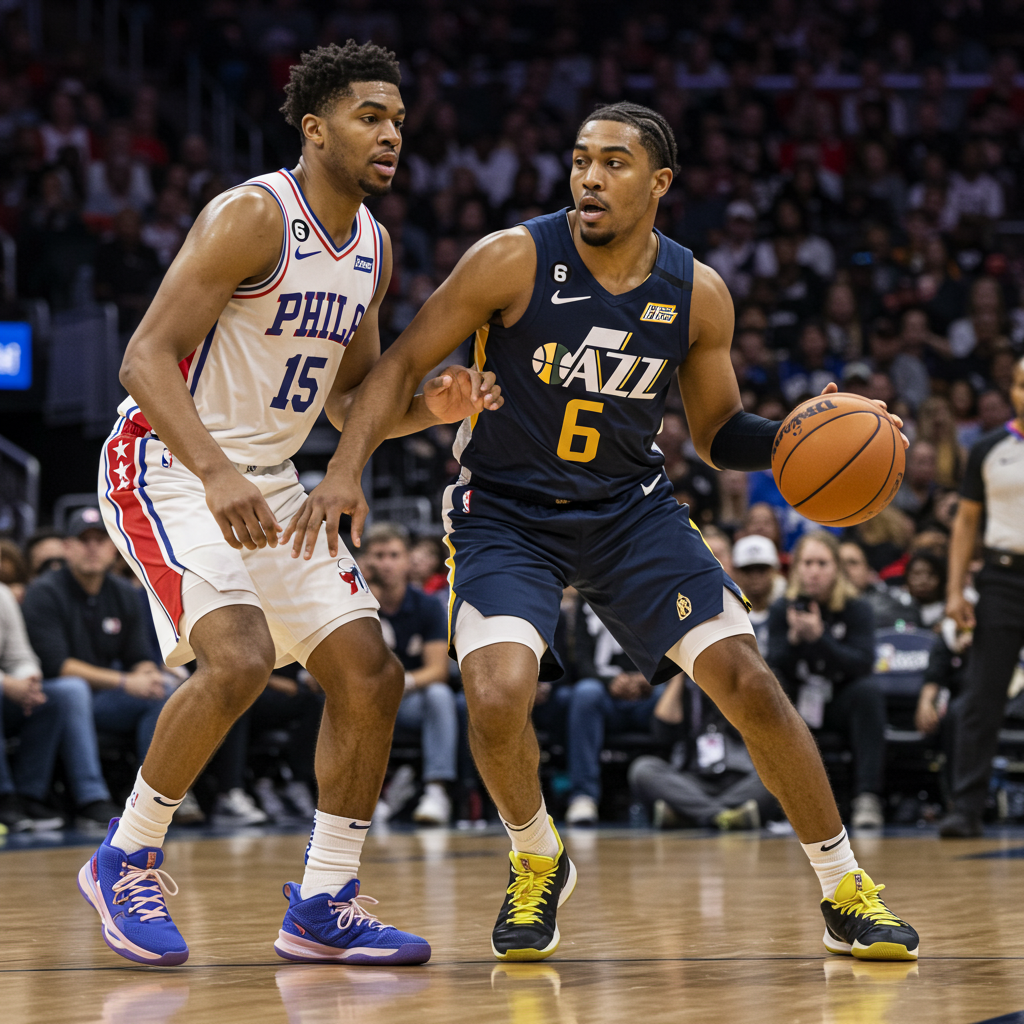Salt Lake City, UT – The Utah Jazz faithful got their first glimpse of highly-touted rookie Ace bailey in action during the recent Salt Lake City Summer league opener. While his offensive numbers in the 93-89 victory over the Philadelphia 76ers weren’t dazzling, the number five overall pick showcased attributes that genuinely excited his new team’s coaching staff and offered key insights into his potential impact. This initial outing highlighted a paradox: a statistically modest performance underpinned by a high-effort approach that points toward a promising NBA foundation.
Hustle Over Highlights: bailey’s Untraditional Debut
Ace Bailey, selected fifth in the 2025 NBA Draft, made his highly anticipated debut for the Jazz on Saturday. Expectations were understandably high for the 18-year-old forward. However, his first game didn’t feature the scoring fireworks many associated with his college potential. Instead, Bailey’s performance was characterized by effort plays and crucial defensive contributions, earning praise from the Utah coaching ranks.
Against the Sixers, Bailey finished with eight points. He struggled with his shooting touch, converting just 3 of 13 attempts from the field. In comparison, Sixers rookie VJ Edgecombe, the third pick, exploded for 28 points, showcasing significant offensive firepower. Despite the statistical disparity, Bailey’s value on the court transcended the traditional box score metrics in this particular contest.
His stat line included seven rebounds in 25 minutes of play. Several of these boards came in traffic, demonstrating a willingness to mix it up inside. This focus on the less glamorous aspects of the game immediately caught the Jazz’s attention.
The Defense and Rebounding Foundation
For the Jazz coaching staff, Bailey’s debut was less about shot-making and more about effort and engagement. His active defensive stance and tenacious rebounding effort were clear positives. At 6 feet 8 inches and 210 pounds, Bailey possesses significant physical tools. Coaches noted his ability and desire to defend and crash the boards effectively.
This willingness to contribute without the ball is often a critical differentiator for young players entering the NBA. It shows a commitment to winning habits and team-first principles. Jazz head coach Will Hardy specifically highlighted these non-scoring efforts. He emphasized that the “dirty work” often goes underappreciated but is fundamental to earning playing time.
Bailey’s athleticism was undeniable, visible in moments like a highlight-reel block where he soared above the rim to deny a layup. These flashes of elite physical capability, combined with consistent effort, paint a clearer picture of his potential impact beyond just scoring.
Clutch Moments and Poise
Despite his offensive struggles, Bailey remained impactful in crucial moments. As the game neared its conclusion, the score remained tight. With the Jazz holding a slim lead, VJ Edgecombe attempted a potential game-tying three-pointer.
Ace Bailey secured the vital defensive rebound following the miss. This clutch play prevented the Sixers from having another possession or tying the game. He was immediately fouled and stepped to the free-throw line. Bailey calmly sank one of two free throws, extending the Jazz lead and effectively sealing the victory.
This sequence demonstrated mental toughness and awareness. Being able to contribute positively in high-pressure situations, even when the offense isn’t flowing, is a significant trait for a young player. It suggests a focus that extends beyond personal statistics.
Coaching Staff’s Positive Assessment
The Jazz coaching staff expressed genuine encouragement regarding Bailey’s debut performance. They acknowledged the offensive rust but prioritized his foundational contributions. Coach Hardy pointed to Bailey’s physical attributes as NBA-ready. He also praised the rookie’s work ethic and coachability over his first week with the team.
Hardy received positive reviews from all coaching staff members and teammates. This feedback underscores Bailey’s integration into the team environment. Building positive relationships and demonstrating a strong work ethic are crucial first steps for any rookie.
Assistant coach Scott Morrison served as the head coach for the Summer League squad. Morrison echoed Hardy’s sentiments about Bailey’s performance. He admitted the team could improve how they involve Bailey offensively. However, he stressed that Summer League is primarily about development and learning.
Morrison described the two-week period as a “crash course” in the NBA. For an 18-year-old transitioning from college, mastering non-scoring aspects is paramount. Establishing reliability in defense, rebounding, and understanding the system is necessary to earn minutes. Once those foundational elements are solid, attention can shift back to refining offensive skills and shot selection.
Beyond the Court: Attitude and Adaptation
Ace Bailey’s arrival in Utah followed an “interesting draft experience,” including prior reports about his desired destinations. There were also mentions of a “slight logistical hiccup” causing a late arrival to Summer League camp. However, reports coming out of Utah consistently suggest Bailey is happy with the Jazz.
He reported to the team the weekend before Summer League practice began. Bailey expressed enthusiasm, feeling “blessed” to be in his current position. This positive attitude has been reflected in his work ethic during practice sessions and individual workouts. The Jazz have been encouraged by his dedication.
Another notable point was Bailey’s engagement while off the court during the game. He sat out for most of the crunch time stretch but remained animated on the sideline. He stood in front of the bench, actively cheering on his teammates. This body language indicates maturity and a team-first mentality, even when not actively participating. He re-entered the game just before securing the decisive rebound.
Adding context, a planned arrangement for Omar Cooper Jr., the son of Bailey’s advisor, to serve as an unpaid guest coach was reportedly called off by the league office due to concerns. While a minor side note, it highlights some of the external factors surrounding a high-profile rookie’s transition.
The Context of the Jazz Rebuild
Ace Bailey joins a Utah Jazz franchise in the early stages of a rebuild. This organizational context is significant for his development path. The Jazz are focused on developing young talent and building for the future. This environment often provides increased playing time opportunities for rookies to learn and grow.
The Jazz drafted Bailey, who averaged 17.6 points in his single season at Rutgers, believing he possessed significant star potential, particularly as a scorer. Their decision came despite him reportedly declining to work out for the team beforehand. This indicates a strong conviction in his talent level by the front office.
His Summer League debut, while not a scoring showcase, aligns with the initial developmental focus for many young players in this situation. Establishing defensive credibility and demonstrating effort are essential building blocks. Given the Jazz’s rebuilding status, Ace Bailey is viewed by some as being in an “ideal situation for fantasy appeal” because playing time is expected to be readily available as he progresses. His long-term offensive potential remains the reason for his high draft slot. The key will be integrating that potential with the foundational skills he demonstrated in his debut.
Frequently Asked Questions
How did Ace Bailey perform statistically in his Utah Jazz Summer League debut?
In his first game for the Jazz, Ace Bailey played 25 minutes, scoring 8 points on 3-of-13 shooting (1-of-5 from three, 1-of-2 free throws). He added 7 rebounds, 1 assist, 1 steal, and 1 block in the Jazz’s 93-89 win against the Philadelphia 76ers. While his scoring efficiency was low, he contributed significantly in other areas, particularly rebounding and defense.
What was the Jazz coaching staff’s reaction to Ace Bailey’s first game?
Jazz coaches Will Hardy and Scott Morrison expressed positive impressions, focusing on Bailey’s effort, defense, and rebounding rather than his scoring. They noted his “dirty work” and physical tools were NBA-ready. Assistant coach Morrison, the Summer League head coach, emphasized that the debut provided learning points and that establishing non-scoring contributions is a priority for the rookie.
Why is Ace Bailey’s hustle and defense considered important for his rookie season with the Jazz?
In the NBA, especially for rookies, consistent effort and defensive contributions are often the quickest ways to earn playing time. Coaches value players who compete hard, rebound, and defend effectively. For Bailey, demonstrating these foundational skills shows he can positively impact the game even when his offense is developing. This “crash course” focus during Summer League aims to build these habits, which are crucial for carving out a role on a rebuilding team like the Jazz, where playing time opportunities could be plentiful.
Looking Ahead
Ace Bailey’s Utah Jazz debut was a mixed bag from a traditional statistical viewpoint. However, it provided the Jazz organization with precisely what they needed to see from their lottery pick: effort, coachability, and foundational defensive and rebounding skills. The scoring will undoubtedly need to improve, but his positive attitude and willingness to do the “dirty work” are encouraging signs. As the Jazz continue their rebuild, Bailey’s development will be a key storyline. His ability to blend his highly-regarded offensive potential with the high-effort habits he showed in his debut will ultimately determine his trajectory with the team. Summer League served its purpose – a chance to learn, adapt, and build the base for a promising NBA career.
Word Count Check: ~1100 words




